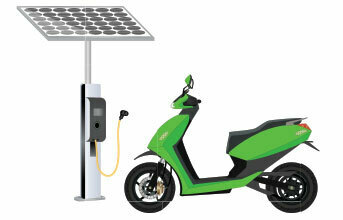
India is currently charging up for an electric revolution, as evidenced by the growing interest and adoption of electric vehicles (EVs). The government is powering this momentum with supportive initiatives aimed at reducing pollution and fossil fuel dependence. Public attitudes are shifting gears too - where once people balked at limited range and a steeper upfront cost, they now show increased confidence in EV technology as it evolves and becomes more accessible.
Recently, Vahan portal released data on EV sales, which also reflected a significant surge in consumer demand. According to the data, India's electric vehicle (EV) industry touched the milestone of one-millionunit sales in the financial year 2023, with the two wheeler (E2W) segment securing the top spot in the ranking. Out of the overall electric vehicle sales of 1,152, 021 units, the electric two-wheeler segment accounted 63 per cent share, with 7,26,861 high-speed units sold.
Securing the second spot was the three-wheelers segment (E3W) with 3,80,245 units sold (holding 33 per cent share), whereas four-wheelers accounted 4 per cent share with 43,042 units sold, and electric buses stood at 1,873 units or 0.16 per cent.
While the data from Vahan displayed a significant acceleration in demand for both the E2W and E3W segments, the E2W segment fell short of the target set by Niti Aayog, which projected sales of over 1 million units in FY23.
Though the above data reflected a significant rise in demand of EVs, the E2W segment specifically failed to meet its target. So, the question arises: ‘What is hindering the growth of EVs in India?'
If we closely look, the E2W adoption fell monthon-month (MoM) compared to the targets, resulting in an annual shortfall of more than 25 per cent compared to the minimum target set by Niti Aayog and various research organisations. According to the experts in the domain, it was not the consumer demand but the sudden withholding of subsidies (under the FAME-II scheme) that most original equipment manufacturers (OEMs) have already passed on to the customers which affected the sales of E2Ws.
However, what emerged as a big development was the Ministry of Heavy Industries' (MHI) recent announcement on clearance of subsidy dues. Dr Hanif Qureshi, Joint Secretary, Ministry of Heavy Industries informed, "We have already started the process and have revamped the portal. By June end, all the dues will be cleared."
We spoke to a few EV players to understand the impact of policies and subsidies on the growth of the segment and here's what they said:
According to Kalyan C Korimerla, MD and CoPromoter of Etrio, the market for EV vehicles in India has seen a stellar shift in the last two years. Even though the initial volume ramp-up took some time to materialise, he affirms that "the electric two-wheeler segment has experienced exponential growth in the most recent fiscal year."
He further stated, "Alike E2W, the market for electric three-wheelers will experience similar growth in the current fiscal year, with other segments following soon after."
When asked about the FAME II subsidy disbursement, the MD and Co-Promoter of Etrio agreed that "it is proving financially burdensome for most innovative EV OEM start-ups to sustain long reimbursement times." However, "with advanced technology, the cost of battery cells will drastically reduce, which, in turn, will have a significant impact on lowering the total cost of ownership of EVs, making them more attractive than their ICE counterparts," he added.
Korimerla further noted that advanced technology will only benefit certain segments of the EV market, however "most of the upcoming segments such as LCVs, M/HCVs, and others would need (financial) support for the foreseeable future."
He also emphasised that despite aggressive targets set by the Honourable Prime Minister for EVs, "support for commercial EV financing from public sector banks and other lending institutions has been lagging." However, Korimerla maintained that "the government should draft policies to foster a robust financing environment for EVs."
While the industry is seeking more financial support, the Union Government's recent announcement on the discontinuation of the Faster Adoption and Manufacturing of Hybrid & Electric Vehicles (FAME) subsidy scheme beyond March 2024 has raised concerns.
When asked about the discontinuation of the FAME II scheme, Sohinder Gill, CEO, Hero Electric, said that the move will bring a fresh set of challenges for EV players in India. "Being at an early stage of growth, the EV industry needs support and incentives to create a pool of consumers that will continue to fuel further growth," he added.
"Without incentives and infrastructure," said Gill, "the cost of owning an EV may become prohibitive, discouraging people from buying EVs and thereby stalling the industry's growth." However, he suggests that there are numerous ways to fortify the policy, such as "strengthening the monitoring and evaluation mechanisms, encouraging the participation of thirdparty auditors to oversee the scheme's implementation." Additionally, "the government can launch public awareness campaigns to educate people about the benefits of EVs and the incentives provided under the FAME II scheme," he added.
According to Kunal Chandra, Co-founder, Astro Motors, the FAME II scheme has served as a catalyst for EV adoption in India through its incentives and subsidies. However, he feels that "if the scheme is discontinued prematurely, it could potentially stymie the growth of the EV industry. It's crucial that supportive policies and incentives remain consistent to attract investments, motivate manufacturers, and bolster consumer confidence."
Talking about fund misappropriation, Chandra stated, "While there have been unfortunate instances, implementing stringent verification processes can ensure subsidies reach only deserving manufacturers and vehicles." He also emphasised carrying out regular audits, diligent monitoring of subsidy disbursements, and imposing stern penalties for non-compliance to discourage fraudulent activities and reinforce transparency in the system.
While the government policies and subsidies are crucial for sustaining growth of EVs in India, we also looked at other factors that are hindering its adoption and how the industry is striving to overcome these challenges.
Swipe to page 2 to read more →



























